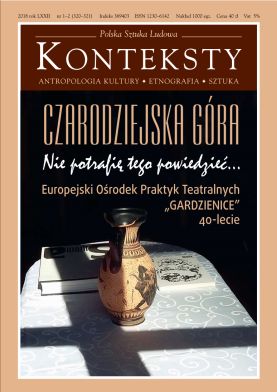Nietota – gościec – uniwersytet piekielny. Uwagi o “Księdze tajemnej Tatr” Tadeusza Micińskiego
Nietota – Rheumatism – University of Hell. Comments on “Księga tajemna Tatr” by Tadeusz Miciński
Author(s): Paweł PróchniakSubject(s): History, Philosophy, Language and Literature Studies
Published by: Instytut Sztuki Polskiej Akademii Nauk
Keywords: Tatry;Tadeusz Miciński;Nietota
Summary/Abstract: The article is an aspect-oriented interpretation of Tadeusz Miciński’s novel Nietota. Księga tajemna Tatr (Nietota: The Secret Book of the Tatra Mountains, 1910), with reflections focused on an analysis of the semiotic potential and construction function of the titular motif and those associated closely with nietota (rheumatism, Angelica archangelica, illness, cure, mystery), considered in the context of their symbolic meanings and inner-textual connections as well as against a wide cultural background, with particular emphasis on the presence of nietota (Huperzia selago, the northern firmoss - a medicinal and, simultaneously, highly poisonous plant) in the imaginarium of folk culture and its magical-medical practices. At the same time the article ponders the self-referential motif of the novel and - in a wider perspective – the inclination of modern literature towards formal experiences of this sort, linked with religious and metaphysical quests. For the author of Nietota such searches were tantamount to an encounter with mystery and, concurrently, became a form of initiation into “astonishing meaning”, which appears in the world of people as “knowledge of darkness and pain”. The article demonstrates that Miciński was convinced that this “’dark knowledge” comes from ”touching a mystery” (and being touched by mystery) while one of its most essential symptoms is the subversive energy and healing power of art.
Journal: Konteksty
- Issue Year: 320/2018
- Issue No: 1–2
- Page Range: 22-42
- Page Count: 21
- Language: Polish
- Content File-PDF

